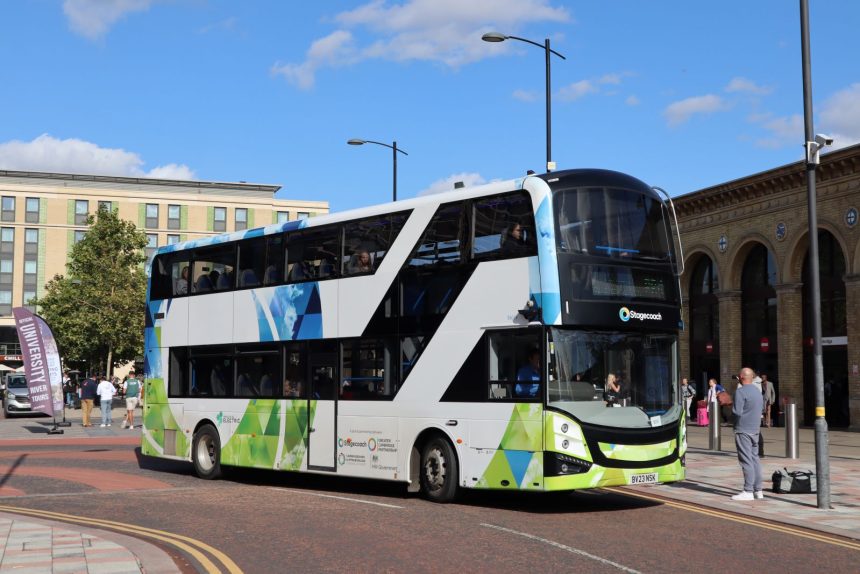From time to time, members of parliament become a little exercised when local authorities place orders for new buses with overseas manufacturers, especially when those businesses are Chinese, expressing their concerns via parliamentary questions and adjournment debates.
Further, an article in the The Sunday Times on 3 March commented that half of the zero-emission buses bought under “a £3 billion buy-British government bus-building programme are made in China and overseas” and that, of the 953 buses ordered using the Zero-Emission Bus Regional Areas initiative, only 470 were placed with Wrightbus or Alexander Dennis, with the others going to China’s Yutong, Sweden’s Volvo, Germany’s Mercedes or Spain’s Irizar.
We know there is real and strongly felt concern in political circles over the UK’s relationship with China for a variety of reasons, which have been reported on at length in the media for some time now. When it comes to issues around national security, or to investment in national critical infrastructure, this concern is understandable. But when it comes to investment in buses, which can hardly be categorised as national critical infrastructure, I have to say I scratch my head at the concerns raised by MPs.
Price is crucial
It would be great, of course, if UK bus manufacturers managed to pick up all the orders placed. But if the buses built overseas, whether in China or elsewhere, are more competitively priced then surely local transport authorities or bus operators are going to go with the most cost-effective offer.
There is an issue, I imagine, over whether any of the overseas manufacturers have any form of government subsidy or support which enables them to offer a more competitive price. That may be a point of concern, but I think that’s a little different to the more broad-brush concerns about simply placing orders with overseas companies. And it’s fair to point out that Wrightbus has been the beneficiary of some material government grants for investment in net-zero technologies.
I’m sure this issue isn’t going to go away and, if the likes of Yutong and Volvo continue to pick up large orders in the UK market, I can see MPs continuing to raise their concerns in parliament. Watch this space, I guess!
Election timing
Meanwhile, as in Westminster terms bus issues more generally are not exactly a hot topic at the moment, I thought I would comment on the growing speculation that the recent Budget was the starting gun for a May general election, presumably to coincide with the local and mayoral elections on 2 May.
With the polls continuing to make grim reading for the Conservatives — with one poll even giving the Labour Party a 35% lead which, if that proves to be an accurate guide to how the electorate actually votes, would be wipe-out territory for the Conservatives — you have to ask why would Rishi Sunak not wait until the autumn to at least give some chance for his party’s fortunes to improve?
It also seems to me that there needs to be a clear sign of a wider improvement in the economy before an election is called, as a further 2p cut in National Insurance doesn’t feel to me to a be a sufficient reason on its own for the electorate to suddenly fall back in love with the Conservatives.
Moreover, for the Conservatives at least, a lot of constituencies still need to select their candidates, so if Mr Sunak is minded to go for a May election then there’s precious little time for the remaining candidates to be selected and for them to start campaigning in earnest. There have to be a minimum of 25 working days for an election campaign, so a general election held on 2 May would mean that parliament would have to be prorogued in the week of 22 March.
A look at the polls
However, to my simple mind, an early election makes no sense when you are so far behind in the polls. It’s true that the polls narrow during an election, and it’s certainly true that recent by-election results have not shown a surge in support for Labour.
The Conservatives have lost recent by-elections in normally rock-solid safe seats because the party’s support has collapsed, not because the vote for Labour increased. In the recent Kingswood by-election, which Labour won by overturning a Conservative majority of 11,000, the Labour vote actually fell by more than 5,000 compared to the 2019 General Election. Further, in Wellingborough, Labour’s vote went down by 107 despite overturning a Conservative majority of over 18,000. In Mid-Bedfordshire, the Labour vote fell by 156 despite overturning a Conservative majority of 25,664 — a pattern repeated in many other recent by-elections.

So Labour has performed well but only because the Conservative vote stayed at home. That vote did not switch to Labour. And polls are showing a consistently high number of people haven’t decided how they will vote. So, it is perfectly possible that, when the general election comes, that stay-at-home Conservative vote will return to the fold and that many “don’t knows” will vote Conservative. It’s possible, but the disenchantment with the Conservatives feels very strong, which is one reason why Reform UK is now enjoying a poll rating of 15%, just 5% behind the Conservatives.
Mr Sunak strikes me as a pretty cautious individual, so I would be surprised if he took a gamble and rolled the dice for a May election. He’s previously been pretty clear that the election would be in the second half of the year and I can’t see any convincing reason why he would change that planning assumption. Some say a May election would catch Labour unawares and unprepared, but Labour has always had May down as a possibility and has been planning with that in mind.
Still, politics is always full of surprises, so I’m going to sit on the fence and be ready for a May election, just in case!



























